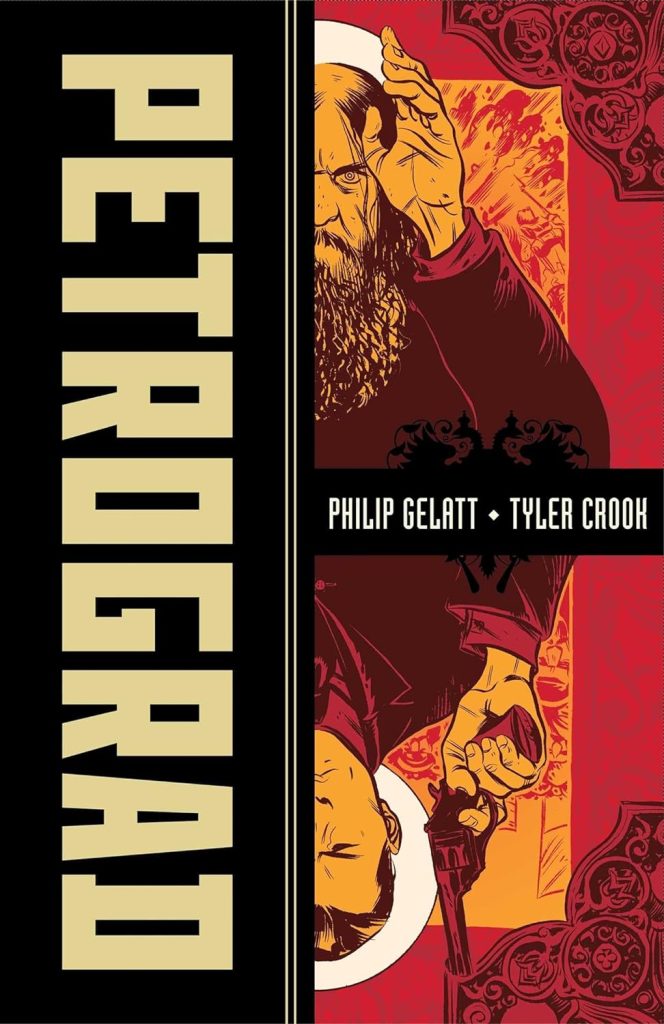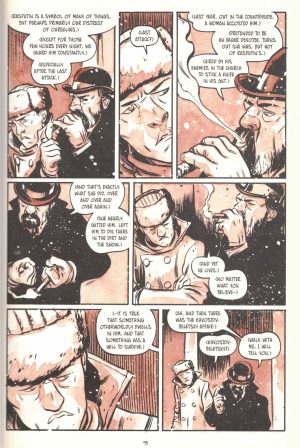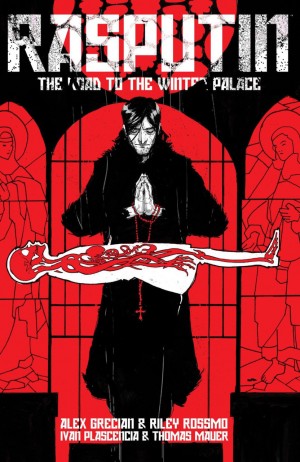Review by Colin Credle
Writer Philip Gelatt introduces the Russian city of Petrograd at the crossroads of history. Originally called St. Petersburg, with the start of World War I Russians decided it was too Germanic and changed the city name. Later, the Communists would change the name to Leningrad before it reverted to St. Petersburg after the collapse of the Soviet Union.
In 1918 the Tsar has a fragile hold on power. The infamous Rasputin possesses undue influence on the Tsarina as only he can treat the haemophilia of their son, the Tsarevich. The fear is Rasputin is secretly opening negotiations with the Germans to exit the war, allowing Germany to concentrate their forces against the Allies. Petrograd is a nest of spies, intrigues, and violence, and the Tsar’s secret service, the Okhrana’s intentions and actions are steeped in murky activity. Meanwhile Communists are organising the workers and the disgruntled.
Our hero is the reluctant English spy Cleary, whose spoken Russian is colloquial and his garb sufficiently Russian that he can pass for a native. He coordinates arrests and infiltrations with the Okhrana, beds a beautiful Communist peasant, parties with Gypsies outside town and meets with Russian aristocrats. Cleary is faced with some moral quandaries as he wades into the trenches of spying surrounded by fickle loyalties.
Tyler Crook’s artwork is in sepia tones suffusing the story with nostalgia and history, superbly setting a murky stage. The Italian influenced architecture in the middle of a winter swamp along with the decrepit worker’s hovels mix in especially well.
Philip Gelatt ensures enough historical trappings provide a captivating plot, yet Russians remain convinced that every momentous lurch in their history is due to the unwelcome interference of foreign powers, so inserting an English agent into the murder of Rasputin seems superfluous. There are plenty of meaty historical moments where the involvement of English spies was likely, known and worthy of exploration. English agents tried to disrupt Lenin’s efforts to organize the revolution, including one plot to kidnap Lenin, strip him and leave him in the middle of the city naked to humiliate him. The murder of Rasputin is fascinating without the insinuated role of an English spy.
It’s also the case that the Communists are presented with more sympathy than is historically justified. It was a violent period and Lenin’s Bolsheviks seized power violently. In Petrograd, the Okhrana accurately embody some of this violence, while Cleary is leery of violence, but more concerned with being returned to the war trenches if he doesn’t play ball.
What follows are predictable and rather shallow betrayals. This is unfortunate as history is more nuanced. Most often betrayals are made by personal preference, fealty, affection, respect, self-preservation and even just incompetence. Not all relationships are based on power and position, and World War I eroded many class divisions. Cleary is most appealing when struggling with his own loyalties: his personal feelings for his Communist paramour, his views on the English Empire and saving his own skin. This journey would have been more riveting if the other characters’ fealties turned out to be as nuanced as Cleary’s, instead betrayals fall into place neatly across class divisions.
Petrograd succeeds in capturing the visuals and the currents of history in Petrograd of this time and Cleary is a compelling lead character. Following him through Petrograd is a fascinating personal journey, but the end falls flat with cardboard characters clinging to their class loyalty to make their decisions. It was a missed opportunity to give more gravitas to these equally important historical personages.





